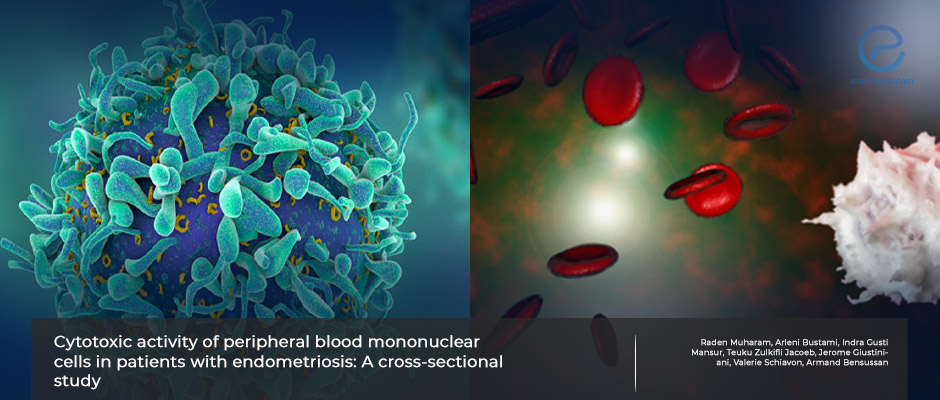Activities of cytotoxic cells in endometriosis
Feb 24, 2023
Reduced natural killer cell activity may contribute to endometriosis, study shows
Key Points
Highlight
- Alterations in immune responses, specifically decreased CD28 and increased CD160 expression, may contribute to the inhibition of natural killer (NK) cell activation and T cell response in endometriosis.
Importance
- Immunological dysfunction particularly reduced cytotoxicity of natural killer cells is thought to contribute to the development of endometriosis.
What’s done here
- Cytotoxic activity of T lymphocytes (markers CD28 and CD160) was investigated in the peripheral blood cells of women with endometriosis aiming to show the effects of cytotoxicity in endometriosis.
- The peripheral blood of patients was also treated with IL-2 after being co-cultured.
- A flow cytometry analysis was performed to evaluate the concentrations of CD28 and CD160.
- A chromium release assay was performed to determine the cytotoxic activity of the NK cells.
Key results
- The concentration of CD3+CD28+ lymphocytes was lower in the endometriosis group compared to the control group before the stimulation.
- No significant changes were seen in the lymphocyte subpopulations after treatment with IL-2.
- Pre-treatment with IL-2 enhanced the spontaneous cytotoxicity of human peripheral blood mononuclear cells against target cells that were observed in all doses of IL-2 in the endometriosis group.
Lay Summary
Immunological dysfunction is thought to be involved in the etiopathogenesis of endometriosis, leading to defective immunosurveillance and the growth of endometriotic lesions. In this pathway, reduced cytotoxicity of peripheral and peritoneal natural killer (NK) cells is seen as a contributing factor, however, it is shown that stimulation with interleukin-2 (IL-2) may increase their potential against tumor cells. CD28 and CD160 are markers of T lymphocyte cytotoxicity that have been studied in peripheral blood mononuclear cells of women with endometriosis. CD28 is a co-stimulatory signal in T cells that may also be involved in NK cell activation, while CD160 is an activating receptor that mediates NK cell cytotoxicity.
With the aim of understanding the cytotoxic activity mechanism in endometriosis, Muharam et al. conducted a study on women with endometriosis, investigating T lymphocytes and their cytotoxicity markers CD28 and CD160 in the PBMCs. The study was published in the September 2022 issue of the International Journal of Reproductive BioMedicine.
After obtaining peripheral venous blood from a total of 14 women (7 patients, 7 controls), leukocytes were immuno-labeled for CD3, CD56, CD28, and CD160. The PBMCs were treated with IL-2 after being co-cultured. A flow cytometry analysis was performed to evaluate the concentrations of CD28 and CD160. Also, a chromium release assay was performed to determine the cytotoxic activity of the NK cells.
The concentration of CD3+CD28+ lymphocytes was lower in the endometriosis group compared to the control group before stimulation. The authors discuss that this finding may be contributing to the inhibition of immune response in the endometriosis microenvironment. After treatment with IL-2, no significant changes were observed in the lymphocyte subpopulations. It was also detected that pre-treatment with IL-2 enhanced the spontaneous cytotoxicity of human PBMCs against target cells including Daudi and K562, and this enhancement was observed in all doses of IL-2 against both Daudi and K562 cells in the endometriosis group. It is stated that soluble immunostimulatory cytokines such as IL-2 can influence NK cell activity as shown in the study.
Even though no change was observed in both groups regarding CD160 expression after IL-2 treatment, taking into account a previous study that they performed, the authors suggest that the increased expression of CD160 and decreased expression of CD28 may inhibit NK cell activation and T cell response in endometriosis. It can be concluded that these alterations in immune responses may contribute to the development of endometriosis.
Research Source: https://pubmed.ncbi.nlm.nih.gov/36313261/
endometriosis cytotoxicity natural killer cells

